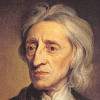“ Who perceives not that a child certainly knows that a stranger is not its mother ”
John Locke, An Essay Concerning Human Understanding (1689). copy citation
| Author | John Locke |
|---|---|
| Source | An Essay Concerning Human Understanding |
| Topic | mother strangers |
| Date | 1689 |
| Language | English |
| Reference | |
| Note | |
| Weblink | http://www.gutenberg.org/cache/epub/10616/pg10616-images.html |
Context
“9. Because Maxims or Axioms are not the Truths we first knew.
FIRST, That they are not the truths first known to the mind is evident to experience, as we have shown in another place. (Book I. chap, 1.) Who perceives not that a child certainly knows that a stranger is not its mother; that its sucking-bottle is not the rod, long before he knows that 'it is impossible for the same thing to be and not to be?' And how many truths are there about numbers, which it is obvious to observe that the mind is perfectly acquainted with, and fully convinced of, before it ever thought on these general maxims, to which mathematicians, in their arguings, do sometimes refer them?”
source


